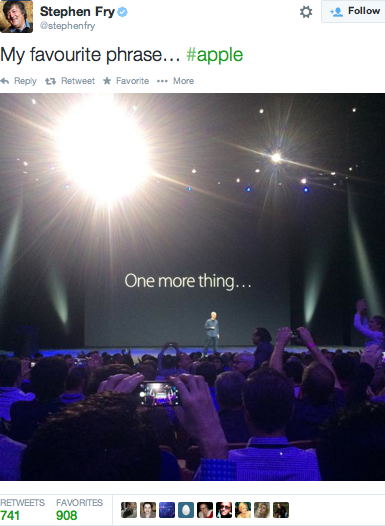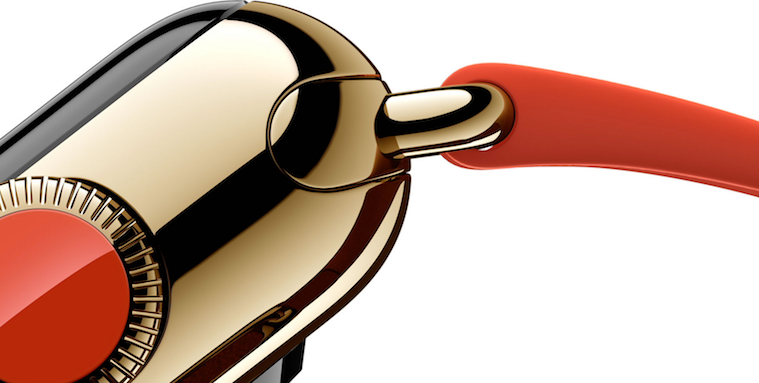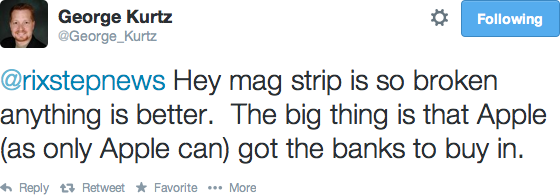Home » Industry Watch
09.09Something money can't buy.
There aren't many global events that can fascinate like an Apple event. It's partly because Apple keep coming up with great products and partly because their marketing is unparalleled. The '09.09' Apple event was such an event.
There are other such Apple events that have gone into history. Such as the Steve Jobs event in 2007 unveiling the iPhone. Steve talked about three new products to introduce, and he kept the three of them distanced from each other for as long as he could. Then he started asking the audience: 'are you getting it?' Those three separate products were of course one and the same: the world's first viable smartphone.
Apple had worked a long time on the device and they had to turn the mobile market inside out. The carriers controlled the market, and OEMs had to adjust their devices to what the carriers were willing to provide. Steve and his friends had to find one carrier willing to break the mold. The world hasn't been the same since.
Steve did it with iTunes too. The record companies tried for years to get people to sign up for their subscriber services, but to no avail. Steve said he sent in teams of PhDs to talk sense into the musical suits, but to no avail. So he kept hitting on them until they 'got it'. The world was forever changed.
Tuesday's event was Tim Cook's. It was his first big product rollout, and one couldn't mistake the elation he felt. And as per usual, he started with some of the boring stuff - but in a new twist, he dispensed with the usual statistics about how well the company had been doing. Instead he launched right into iPhone 6 and iPhone 6+. iPhone may no longer be the biggest seller, but it's still the yardstick by which all the others are measured.
And then with a feeling he could hardly contain, he announced 'one more thing'. Stephen Fry, who'd flown over to Cupertino for a mere day to sit in that audience, one of the two first - along with the late great Douglas Adams - Mac adapters in the UK back in the day, tweeted about it straight away.

And of course that one more thing was Apple Watch. Numerous people responded to Stephen's tweet with references to Peter Falk's Columbo; whether they were ribbing him or they really didn't remember the way Steve Jobs used it...
Out came Apple Watch.

Say what you want about gadgets and devices; look instead at the work behind such a monster project. Apple had several dozen companies involved. They probably needed a good three years to conceive of the product, to design it, to build new code frameworks, build new hardware, and invent new physical components that hadn't yet been invented... And they kept a lid on it. Again.
And couple this with Apple Pay, introduced minutes earlier. Once again as with the original Mac with its pointing device, others had done it before. But once again, the others hadn't succeeded.
Apple weren't first with the mouse. That distinction probably belongs to Doug Engelbart and his team at SRI. Alan Kay's LRG at Xerox PARC also worked with a mouse. But it was Apple, through several hundred iterations, that brought it to market and made it work. Their marketing team contributed their legendary '1984' ad shown but once at a football match.
And there again they turned the world inside out. They made a dent in the universe. Pundits wrote about right side versus left side of the brain thinking. Icons arrived, thanks to Susan Kare, who'd spent some time figuring out how they should look and what they should portray. Standards that hold to this day.
Back then, the personal computing world belonged to IBM - then later Microsoft - and everyone used text on a command line. But where are we today? And why?
The perceptive pixel: the fact that screen pixels can manage both input and output. And from that an early attempt at a tablet, then cut first to the phone. And keep it all under wraps for the longest time. And then get the leader up on stage to give a keynote.
Things didn't start too well for Tim Cook on Tuesday, and may not have ended well either, but in between, for the better part of two hours, Tim and his team kept the whole world spellbound.
Some might be taken in by the glitz. Oh I gotta have one now, Tim! Don't say any more, just take my cash! Apple products do look good, and Steve Jobs liked gadgets. But here one must look beneath the surface, see what's really going on.
This is Tim Cook's company now, wrote Walt Mossberg, citing a number of technical reasons. But it's more than that. Where Steve was focused on the gadget, Tim is more focused on the people. Steve admitted he was an asshole, a beloved asshole perhaps; but no one's going to call Tim an asshole. He comes from a different mold. He cares not only or even primarily about gadgets, but about people. He's looking first and foremost not at the products themselves but at how they improve things for people.
Apple Pay's a new payment system. The magic here is that Apple - precisely as they did with the iPhone - went ahead and got the backing of industry leaders, in this case the banks. As security guru George Kurtz tweeted:

And that's the trick. As with the music industry, as with the phone carriers, they get the backing and support to get the product mainstream. As only they can.
You just move your mobile device in the vicinity of the other device at the checkout and zip! Your transaction is completed. That's pretty amazing, but again: it's what's happening under the bonnet: the clerk won't have your name, or address, or credit card data, or your PIN, or anything. PINs for that matter are gone. And Apple won't have any of that either. The transaction is processed with a unique ID that's used only once, so even if someone can hack your device, the ID isn't good anymore.
The banks are buying into the system.
Similar technologies are built into the watch. Wave your watch at your hotel room door and it unlocks. Again: Apple have hotel chains already signed up.
The watch is also a fitness device. It's a device that monitors your vital signs for your just wearing it. You can send your actual heartbeat to a contact because the watch is monitoring your pulse. Yes. The danged thing knows when you're climbing stairs, when you're running, and gives you stats on how much you've worked out, how many calories you've burnt, and this just because you have it on your arm.
The user interface is all different of course. As Tim explained, you can't just shrink everything you used on iPhone. You have to redesign it. And that means new device drivers, new frameworks, new APIs, because no one's ever done this before. You have the traditional watch crown, which they now call the 'digital crown', and you can both twirl it and push it in, typically for a 'home screen'.
The screens also use two types of input: the 'tap' and the 'press'. This because their hardware (and as a result their drivers and APIs) can detect both.
And so forth. And so on. And so forth. And so on.
It's impossible to not cheer along with Tim when he raises his arms in triumph after the demonstration. Tim's chuffed, and we should be too. '09.09' was a major event; it made us all happy - for once we could forget all the misery in this screwed-up world and concentrate on the positive, on real progress; and it's an event we long will remember.
People at this site came to Apple not for gadgets but for the hope that something would rid the world of Windows, the system that proudly gives us viruses, worms, and spam. The list of ridiculous things Microsoft are responsible for is endless. No other industry in the history of industries has ever had such a bad track record. There are cottage industries built solely on the premise that Microsoft products will continue to be utter crap.
But Steve and Apple weren't interested. The desktop war is over, said Steve: Microsoft won. There wasn't much reflection on the fact that if Microsoft won, everybody lost. Steve just turned his head and walked on.
It's only now that some of us finally see what's going on. None of us are the gadget types; many of us probably wouldn't use computers much, if only for use as ordinary users. Computers? Use them to support others who use them. But what Apple are doing is not trying to rid the world of a desktop menace, but to bring technology to people in a way only they can. To do that, they have to design the very best products and use their clout and persuasion to get the market to accept them. And they do it every time.
Perhaps they saw the sunset of the personal computer long ago. And last anyone looked, the Redmond company still hadn't come up with anything noteworthy in nearly twenty years. (All for the better, some would say.)
Apple events seem friendly informal dos. The Apple people come on stage in jeans and trainers. But looks really deceive, for those gigs are rehearsed meticulously until they work like clockwork, with nothing left to chance. Their magic is how they seem to be so informal, so easy.
Apple have given us the first mainstream personal computer with a graphical user interface and a pointing device, they gave us the successor to the Walkman, they gave us the smartphone, they gave us the tablet, and now they're giving us the smart watch. That's quite a list of accomplishments.
And they already have the world's best laptop, actually the biggest seller too, no matter the OS.
And time and again they give us something money can't buy: they give us happy.
Thank you for making this an unforgettable day.
- Apple Live
See Also
Apple: Apple Pay
Apple: Apple Watch
Apple: September 2014 Special Event
eWeek: Apple Pay Could Be a Credit Card Security Game Changer
Re/code: It's Tim Cook's Apple Now
|